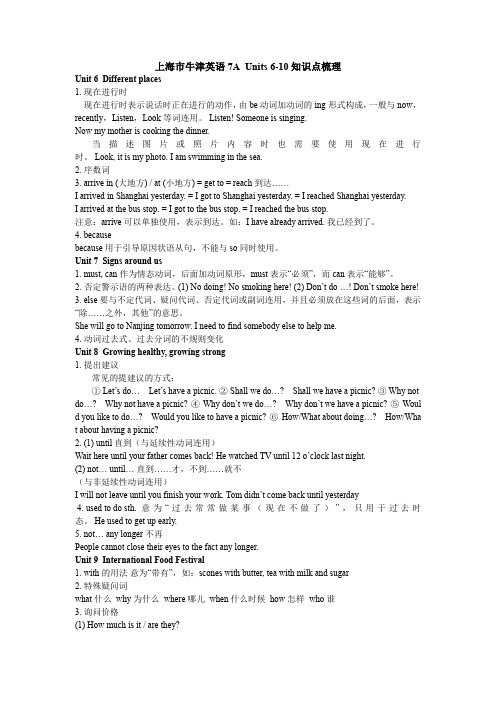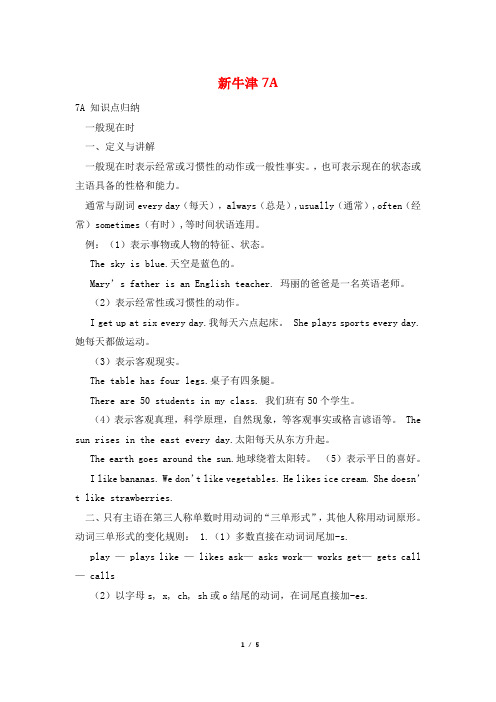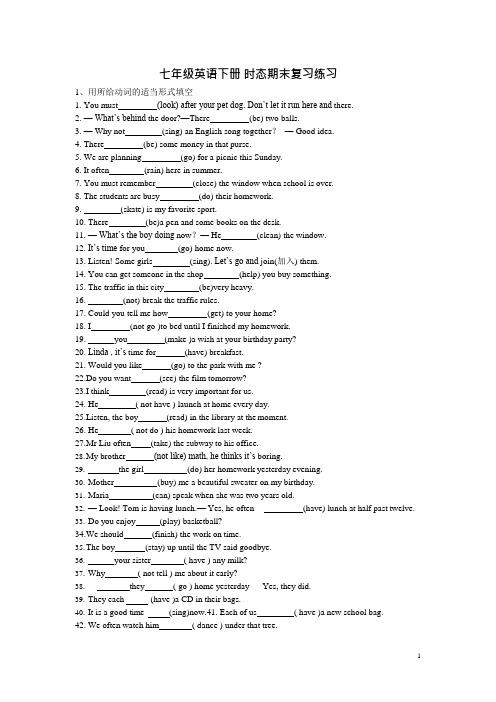牛津英语7A___时态练习
牛津英语7A Unit1-8 期末复习语法汇总

牛津英语7A Unit1-8 期末复习--语法总结Unit1-2 一般现在时1. 一般现在时的概念一般现在时表示经常的、习惯性的动作或存在的状态。
2. 一般现在时的构成:主语+动词原形+宾语一般现在时的构成主要有两种形式:A.be型:句子的谓语动词只有be(am,is或are):a.肯定句中,只出现be,如:I am a student.我是一名学生。
b.否定句中,要在be后面加not,如:She isn't a teacher.她不是教师。
c.一般疑问句,要将be放在句子开头(注意句首字母大写),句尾用问号,答语用Yes,主语+be.或No,主语+be+not.如:—Are you ready?—你准备好了吗? —Yes,I am.—是的,我准备好了。
(—No,I'm not.—不,我没准备好。
)B.实义动词型:句中的谓语动词为实义动词(也叫行为动词):a.肯定句中,只出现实义动词,如:I get up in the morning.我早晨起床。
b.否定句中,要在实义动词前面加do(does)+not,do(does)作助动词,本身无意义,常与not 缩写成don't(doesn't),如:I don't like vegetables.我不喜欢蔬菜。
c.一般疑问句,要在句子开头加助动词Do(does),句尾用问号,简略答语用Yes,主语+do(does).或No,主语+do(does)+not.如:—Do you like oranges?—你喜欢桔子吗? —Yes,I do.—是的,我喜欢。
(—No,I don't.—不,我不喜欢。
)C.there be型there be型句子表示“存在”,其构成为“the re be+主语+其他”,表示客观事实。
用法遵循“就近原则”,即主语是单数或并列主语中的第一个主语是单数,则用there is;主语是复数或并列主语中的第一个主语是复数,则用there are。
上海市牛津英语7A

上海市牛津英语7A Units 6-10知识点梳理 Unit 6 Different places 1. 现在进行时 现在进行时表示说话时正在进行的动作,由be动词加动词的ing形式构成,一般与now,recently,Listen,Look等词连用。 Listen! Someone is singing. Now my mother is cooking the dinner. 当描述图片或照片内容时也需要使用现在进行时。 Look, it is my photo. I am swimming in the sea. 2. 序数词 3. arrive in (大地方) / at (小地方) = get to = reach 到达…… I arrived in Shanghai yesterday. = I got to Shanghai yesterday. = I reached Shanghai yesterday. I arrived at the bus stop. = I got to the bus stop. = I reached the bus stop. 注意:arrive可以单独使用,表示到达。如:I have already arrived. 我已经到了。 4. because because用于引导原因状语从句,不能与so同时使用。 Unit 7 Signs around us 1. must, can作为情态动词,后面加动词原形,must表示“必须”,而can表示“能够”。 2. 否定警示语的两种表达。 (1) No doing! No smoking here! (2) Don’t do …! Don’t smoke here! 3. else要与不定代词、疑问代词、否定代词或副词连用,并且必须放在这些词的后面,表示“除……之外,其他”的意思。 She will go to Nanjing tomorrow. I need to find somebody else to help me. 4. 动词过去式、过去分词的不规则变化 Unit 8 Growing healthy, growing strong 1. 提出建议 常见的提建议的方式: ① Let’s do… Let’s have a picnic. ② Shall we do…? Shall we have a picnic? ③ Why not do…? Why not have a picnic? ④ Why don’t we do…? Why don’t we have a picnic? ⑤ Would you like to do…? Would you like to have a picnic? ⑥ How/What about doing…? How/What about having a picnic? 2. (1) until 直到(与延续性动词连用) Wait here until your father comes back! He watched TV until 12 o’clock last night. (2) not… until… 直到……才,不到……就不 (与非延续性动词连用) I will not leave until you finish your work. Tom didn’t come back until yesterday 4. used to do sth. 意为“过去常常做某事(现在不做了)”,只用于过去时态。 He used to get up early. 5. not… any longer 不再 People cannot close their eyes to the fact any longer. Unit 9 International Food Festival 1. with的用法 意为“带有”,如:scones with butter, tea with milk and sugar 2. 特殊疑问词 what 什么 why 为什么 where 哪儿 when 什么时候 how 怎样 who 谁 3. 询问价格 (1) How much is it / are they? 32. need to 需要做 You need to finish your homework. 你需要完成你的家庭作业。 33. be unkind to 对……不友好 Sometimes people are unkind to animals. 有时候人们对动物不友好。 34. save…from danger 从危险中挽救 Firemen save people from danger. 消防员将人们从危险中挽救出来。 35. help …do 帮助……做某事 I often help my mother do housework. 我经常帮妈妈做家务。 36. promise to do 承诺做某事 My parents promise to buy me a cat. 我的父母承诺要帮我买只猫。 37. ask sb. to do 要求某人做某事 He asks me to get him a bag. 他让我给他拿只包。 38. many years ago 很多年以前 Many years ago, people lived in caves. 很多年以前,人们住在山洞里。 39. keep…from… 保护,使免受 Dogs keep people safe from danger. 狗保护人们免受危险。 40. cross the road safely 安全过马路 41. in many different ways 通过很多不同的方式 Dogs help people in many different ways. 狗通过很多不同的方式帮助人们。 42. missing people 失踪的人 用心 爱心 专心 43. bring… to 将……带来 Please bring the recorder to me. 请将录音机带给我。 44. over 超过 = more than 超过 Over 6 million people live in Garden City. 超过六百万人住在花园城市。 45. most of …大多数的…… Most of the presidents are men. 大多数的总统是男人。 46. for example 举一个例子 For example, sunflowers are yellow. 举例来说,向日葵就是黄色的。 48. know about 知道关于 I want to know about our new teacher. 我想知道关于我们的新老师的事情。 49. send…to 寄……到 She sent her photo to the agency. 她把照片寄到了代理处。 50. write soon 尽快回信 51. tell sb. about 告诉……关于 Please tell me about yourself. 请告诉我关于你自己的事情。
新牛津7A

新牛津7A7A 知识点归纳一般现在时一、定义与讲解一般现在时表示经常或习惯性的动作或一般性事实。
,也可表示现在的状态或主语具备的性格和能力。
通常与副词every day(每天),always(总是),usually(通常),often(经常)sometimes(有时),等时间状语连用。
例:(1)表示事物或人物的特征、状态。
The sky is blue.天空是蓝色的。
Mary’s father is an English teacher. 玛丽的爸爸是一名英语老师。
(2)表示经常性或习惯性的动作。
I get up at six every day.我每天六点起床。
She plays sports every day. 她每天都做运动。
(3)表示客观现实。
The table has four legs.桌子有四条腿。
There are 50 students in my class. 我们班有50个学生。
(4)表示客观真理,科学原理,自然现象,等客观事实或格言谚语等。
The sun rises in the east every day.太阳每天从东方升起。
The earth goes around the sun.地球绕着太阳转。
(5)表示平日的喜好。
I like bananas. We don’t like vegetables. He likes ice cream. She doesn’t like strawberries.二、只有主语在第三人称单数时用动词的“三单形式”,其他人称用动词原形。
动词三单形式的变化规则: 1.(1)多数直接在动词词尾加-s.play — plays like — likes ask— asks work— works get— gets call — calls(2)以字母s, x, ch, sh或o结尾的动词,在词尾直接加-es.Watch — watches wish — wishes do — does go — goes (3)以―辅音字母加 - y‖结尾的动词,要先变y为i再加-es.try — tries study — studies cry — cries fly — flies 2.不规则变化:be — is have — has 三、一般现在时的句子转换:(1)变一般疑问句:当句子中有be动词或情态动词时,则把be动词或情态动词(can,could等)提到主语的前面,(口诀:一调二变三问号);(2)变否定句:在be动词或情态动词后面直接加not变成否定句. (be后not 莫忘记) 例:①陈述句:She is my sister..疑问句→ Is she your sister? Yes, I am./ No, I’m not. 否定句→ She is not my sister. ②陈述句:I can play soccer.疑问句→ Can you play soccer? Yes, Ican. / No, I can’t.否定句→ I can not /can’t play soccer.注意:对一般疑问句的回答:一般用什么问就用什么来回答。
牛津英语7A语法(一)一般过去时的构成及用法

牛津英语7A语法(一)一般过去时的构成及用法199牛津英语7A语法(1)一般过去式的构成和用法一般过去式的形式:动词be:第一人称单数和第三人称单数的用法是,其余的用法是动词have:都用have,没有人称和数的变化动作动词:它们都使用过去式。
人和号码没有变化。
动作动词有两种过去式,一种是规则动词,另一种是不规则动词我曾是...你是...他/她/它是动词...我们是你是你动词他/她/它有我们是你是你行为动词他/她/它(研究)我肯定你不确定。
我们应该使用助动词do的过去否定形式,而谓语动词也应该使用其原来的形式。
在非正式语言中,如英语口语我们可以使用紧凑的形式。
一般问题和简短回答一般问题?是吗...?是吗...?不,我不是。
是的,他不是。
不,他不是。
是的,他们是。
不,他们不是。
动词有你吗...?他有吗...?他们有吗...?是的,我有。
不,我没有。
是的,他有。
一个简短的回答是1不,他没有。
是的,他们没有。
是的,他们没有。
是的,我有。
他学习了吗...?他们学习了吗...?注:不是、不是、没有和没有可分别缩写为不是、不是、没有和没有。
动词be动作动词(研究)特殊问题她在哪里?你什么时候学习英语的?回答动词的一般过去式:有规则和不规则的变化。
规则动词的过去式是在原来的动词形式后加上-ed形成的。
写作和阅读方法如下:在辅音+y的动词后增加个以E结尾的带重音的封闭音节或R音节的动词,在y-ed的动词后增加只以一个辅音结尾的动词。
在双辅音字母后,将-d加到I和add-ed(以x结尾的单词除外)。
清辅音后,读元音和浊辅音后的[t],读辅音后的[d],读[id] 3)一般过去用法:a。
表示过去的行为或状态,常与过去时间的状语连用。
例如,昨天、上周、三天前、1998年等等。
,或由when引导的子句。
我昨天看见他了。
她两年前买了这辆自行车。
他刚才在那里。
你年轻时住在哪里?b .也可以用来表示在过去某段时间内频繁或重复发生的行为。
牛津版7年级下学期期末复习时态练习(可编辑修改word版)

七年级英语下册时态期末复习练习1、用所给动词的适当形式填空1.You must (look) after your pet dog. Don’t let it run here and there.2.—What’s behind the door?—There (be) two balls.3.— Why not (sing) an English song together?— Good idea.4.There (be) some money in that purse.5.We are planning (go) for a picnic this Sunday.6.It often (rain) here in summer.7.You must remember (close) the window when school is over.8.The students are busy (do) their homework.9.(skate) is my favorite sport.10.There (be)a pen and some books on the desk.11.—What’s the boy doing now?— He (clean) the window.12.It’s time for you (go) home now.13.Listen! Some girls (sing). Let’s go and join(加入) them.14.You can get someone in the shop (help) you buy something.15.The traffic in this city (be)very heavy.16.(not) break the traffic rules.17.Could you tell me how (get) to your home?18.I (not go )to bed until I finished my homework.19.you (make )a wish at your birthday party?20.Linda , it’s time for (have) breakfast.21.Would you like (go) to the park with me ?22.Do you want (see) the film tomorrow?23.I think (read) is very important for us.24. He ( not have ) launch at home every day.25.Listen, the boy (read) in the library at the moment.26. He ( not do ) his homework last week.27.Mr Liu often (take) the subway to his office.28.My brother (not like) math, he thinks it’s boring.29.the girl (do) her homework yesterday evening.30.Mother (buy) me a beautiful sweater on my birthday.31.Maria (can) speak when she was two years old.32.— Look! Tom is having lunch.— Yes, he often (have) lunch at half past twelve.33.Do you enjoy (play) basketball?34.We should (finish) the work on time.35.The boy (stay) up until the TV said goodbye.36.your sister ( have ) any milk?37.Why ( not tell ) me about it early?38.--- they ( go ) home yesterday --- Yes, they did.39.They each40.It is a good time (have )a CD in their bags.(sing)now.41. Each of us ( have )a new school bag.42.We often watch him ( dance ) under that tree.43.He like ( live) in the countryside.44.---Who cleaned the room yesterday?--- I ( do ).45.What you ( do) the day before yesterday?--- I ( go ) home to see my parents.46.What’s the best time ( go ) to your country?47.She is good at ( sing) English songs.48. I wish ( travel) around our country.49.Look, the bus ( come).50.Jim can’t( swim) in the river.51.T hose (child) are my (classmate).52.That is (he)bird. (it)name is Polly.53.Look ! It is (we) school.54.Is it (Kate) eraser?No, it’s.( I )55.H e's a boy.(China)56.It’s raining(heavy)57.and rooms are beautiful (Tom\Jim)58.There (be) some milk in the bottle.59.She must (look) after her mother.60.t he tourists (get) here soon?61.What he (do) now?62.Tom likes (run)in the morning.63.One of the (watch) is mine64.Old Henry (sit) on a bench and watched his dog in the park.65.Oh,what a (sun) day!66.Sometimes he (go) to school on foot.67.She often (watch) TV on Sundays.68.The boy (not bring ) his homework every day.69. you (like) English?70.What his father usually in the evening (do) ?71.Mr. Liu (have) no children.72.We (not have) lessons on Saturdays.73.his mother (cook)? Yes, she does.74.Forty plus fifty (be) ninety.75.My brother (like)playing football very much76.Where do your grandparents come from? They (come) from Guangdong.77.They (have) a party yesterday evening.78.She (not play) the guitar last week.79.your sister (study) in this school two years ago?80.There (be) a little factory in this town in 2001.81.you (see ) a film this morning?82.Where you (work) last year?83.When you (buy) the book? I (buy) it when I (be) ten years.84.he (live) here? No, he didn’t.85.He (read) an interesting book now.86.She (make) a model plane these days.87.Look! The boys (play) soccer.88.Listen to the little girl. She (recite) a poem.89.Where is Tom? He (stand) under the tree.90.It’s five o’clock. The students (play) sports.91.What are you doing? I (write) and he (watch) TV.92.your friends (prepare) for the test? Yes, they are.93.He (not do) his homework. He (play) video games now.94.They (leave) here tomorrow.95.I (not go ) to the city next week.96.he (come ) here and help me this evening?97.There (be) a school here in 2007.98.The Olympic games (hold) in Beijing in 2008.99.What the weather (be) like the day after tomorrow? 100.What day it (be) the day after tomorrow?。
牛津英语7A U8 Grammar

• 基本结构: be (am, is, are) + 动词现在 分词(-ing form) • 常见的表示时间的词语: I am doing homework now. He's dealing with his post at the moment. We are swimming at the moment. Look! They are sitting on the chairs. Listen! Amy is singing in the next room.
II. 根据句子中的时间情境完成动词填空。 1. It’s six o’clock in the morning. Simon is getting (get) up. _________ are making (make) 2. Look! Some boys ___________ model planes. is lying (lie) on the ground 3. The dog _______ now. are listening (listen) 4. At the moment, we ___________ to our teacher. is singing (sing) an 5. Listen, Daniel ___________ English song.
have a class
read
look for things on the Internet
Complete the conversation: Sandy: Hello, Amy. Are you doing your homework now? Amy: No, I’m not. My cousin Shirley is visiting (visit) me. _________ Sandy: Oh, really? What _____ is she doing (do) now? _______ Amy: Well, she _________ is playing (play) a computer game.
上海市牛津英语7A-M1-U2-课时练
维提高能力注重阅读激发思巩固基础Exercise 1 for Our animal friends (7AM1U2)I. Translate the following into English. ( 把下列翻译成英语。
)1.一位动物保护协会官员2.把⋯遗留在大街上3.保留一只作为你的宠物4.又饿又渴5.带它们去动物保护协会6.没有食物和水7.动物保护协会(全称)8.想要9. 你最喜欢哪一个?10. 我更喜欢那只黄棕相间的那一个。
II. Read and choose the best answer. ( 选择最佳答案。
)( ) 1. Hello, everyone! I ’m SPCA officer.A. aB. anC. theD. /( ) 2. I like this little dog very much. Let ’s call __________ Sam.A. himB. heC. hisD. he’s( ) 3. Yesterday someone _______ two puppies in the street.A. leftB. leaveC. leavesD. will leave( ) 4. I want to keep the white dog my new pet.A. forB. ofC. withD. as( ) 5. The baby is too young. He can ’t speak walk.A. andB. butC. orD. so( ) 6. This pen doesn’t work, can you give me another ?A. onesB. oneC. one’sD. once( ) 7. I 300 yuan for the dog food.A. tookB. spentC. paidD. cost( ) 8. I really don ’t know ______________.A. to choose which puppyB. to which puppy chooseC. which puppy to chooseD. choose which puppy( ) 9. Do you know ___________ the SPCA is?A. howB. whyC. whenD. what( ) 10. ---Which one do you like best of these balls? --- .A. Yes, I doB. No, I don ’tC. I don’t prefer the green one.D. I prefer the yellow one.III. Fill in the blanks with the proper forms of the given verbs. (时态填空)1. My father (buy) a new bicycle for me yesterday.2. Look, Mr. Hu and his students (visit) Beijing now.3. we (have) a picnic in the Century Park tomorrow?4. Judy ____ (watch) cartoons every evening.5. Mary ____ ( stay ) in Beijing for a week.IV . Complete the sentences with the given words in their proper forms. (用所给)词的适当形式填空。
牛津上海版7A状语从句专项讲解及练习(有答案)
状语从句一、基本概念状语从句指的是在主从复合句中作状语的从句,修饰主句中的动词、形容词或副词等。
状语从句由从属连词引导。
状语从句放在主句之前时,常用逗号分开;若放在主句之后,一般不用逗号。
二、基本分类1.时间状语从句:When Susan goes to town, she will visit her grandma.2.条件状语从句:If he works hard, he will surely succeed.3.结果状语从句:Waste must be treated so that it does not become a danger to life.4.目的状语从句:They worked hard in order that they might succeed. 5.原因状语从句:Mary didn't go shopping because I advised her not to.6.让步状语从句:Though we are all different, we need never be separate.7.比较状语从句:I was happier than I had ever been in my life.8.地点状语从句:I will go where I am needed.9.方式状语从句:I have changed it as you suggest. 三、用法详解时间状语从句1)引导词:2)辨析:※until,till用于肯定句时,表示“直到……为止”,主句必须为持续性动词。
We shall wait until/till he comes back.Everything went well until/till that accident happened.※not…until/till表示“直到……才……”,主句通常要用短暂动词,这时until和till可用before代替。
牛津英语 7A Unit1 period 5 grammar(优质精选)
go have live love take talk like
1. She__l_iv_e_s__ in a flat in Beijing.
2. She__h_a_s___breakfast at 7 a.m.
3. She__g_o_e_s__to school with her friend.
Model 2. He likes reading. (writing) He doesn’t like writing.
1. I like red. (green) I don’t like green.
2. They like apples. (oranges)
They don’t like orange. 3. We take a bus to school on foot every day. (walk
I/You/We/They like fish. I/You/We/They don’t like milk.
He/She/It likes fish. He/She/It doesn’t like milk.
课件在线
3
To use the simple present tense
when we talk about : Things ar don’t walk to scho课o件l在e线very day.
8
10
Model 1: I like fish. (meat) I don’t like meat.
Model 2. He likes reading. (writing) He doesn’t like writing.
4. She__l_o_v_e_s_her cousin Andy very much.
牛津上海版7A情态动词基本用法专项讲解及练习(有答案)
情态动词基本用法一、基本概念及特征二、基本分类只作情态动词的有:must, can (could), may (might)可作情态动词也可作实义动词的有:need ,dare可作情态动词也可作助动词的有:will (would), shall (should)具有情态动词某些特征的有:have to, ought to ,had better三、用法详解1、情态动词基本用法1)can/could表示能力,意为“能、会”。
Two eyes can see more than one.Could the girl read she went to school?⑵ 表示请求或允许,多用于口语中,意为“可以”,相当于may 。
You can go now.Can I have a look at your new pen?He asked whether he could take the book out of the reading-room.⑶较委婉客气地提出问题或陈述看法。
Can (Could) you lend me a hand?注意:情态动词的过去式除了表示过去的时间这一用法外,更多时候表达一种比原形更为委婉客气的语气。
尤其在出现在宾语从句主句中时,并不影响从句的时态。
练习:用can 或could 填空.1)I'm really hungry. I_____________ eat a horse!2)It's so nice here. I ____________ stay here all day but I have to go.3)"I can't find my bag. Have you seen it?" "No, but it_____________ be in the car."4)Peter is a musician. He plays the violin and he____________ also play the piano.5)The weather is nice now but it_____________change later.keys: 1) could 2) could 3) could 4) can 5)could2)may/might⑴表允许,might可以指过去时间,也可指现在时间,语气更委婉。
- 1、下载文档前请自行甄别文档内容的完整性,平台不提供额外的编辑、内容补充、找答案等附加服务。
- 2、"仅部分预览"的文档,不可在线预览部分如存在完整性等问题,可反馈申请退款(可完整预览的文档不适用该条件!)。
- 3、如文档侵犯您的权益,请联系客服反馈,我们会尽快为您处理(人工客服工作时间:9:00-18:30)。
1 牛津英语7A 时态练习 动词填空: 1.I______(be not) a middle school student. 2.She ______(be) in Class Six ,Grade One .We________(be) all Young pioneers. 4.Sam and I________(be) in different classes . 5.There _______(be) a map on the wall. There _______(be) some boats in the river. 7.There__________(be) a pencil-box and some books in the bag . 8.There__________(be) two bikes and a car near the house. 9.I can ___________(see) some flowers on the table. 10. You must__________(find) those things. 11. ______ you ________(have) a new watch? 12. Let me _________(see),please. I __________(not have) a watch . 13. I think he ___________(be)back in a week. 14. It's time ___________(play) games. 15. I want ___________(take) some books to the classroom . 16. Could you ___________(take) it to your room ? 17. It's snowing now. We can go out __________ (play) in the snow. 18. ___________(not jump) too high! Would you like___________(drink) tea ? 19. She __________(like) her new skirt . 20. The men ____________(work) near the house now. 21. Look! The teachers ___________(talk) to the students. 22. The best time _________(visit ) China _______(be) Spring or autumn. 23. Can you __________(look) after her ? 24. Don't ________(talk). Jim _________(do) his homework.. 25. ----What _________ you _________(do) ? ----I ___________(close) the windows. Look! The windows are__________(close) now. 26.They __________(like)the kite very much. 2
27. Where _________ your brother________ (come) from? 28. Bill ________ (stay) at home every Sunday. 29. I can help you ________ (carry) the things. I'd like something________ (eat). 30. It's better to play computer games than __________(watch) TV. 31. What _______ you _______ (do)? I'm a farmer. What _______ you _______ (do) now? I'm ______(put) rice in bags. 32. Mike _______ (read) English in the morning. He likes _______(read) very much. 33. ______ they ______ (speak) Japanese? Yes, they do. 34. Jim _______ (not have) any apples, she wants _______ (get) some. 35. Would you like _______ (borrow) it? Does he like ________ (sing)? 36. ________(live) in the country ________(be) better than living in the city. 37. We _____ (stay) at home on Sundays. He ______ (go) to classes every week. 38. Stop _________(talk). Let's begin our class. 39. ________ he _______ (have) any sisters? She _______ (say) she's late. 40. Where ______ he _______ (work)? He _______ (work) in a factory near here. 41.When he met his teacher in the street, he stopped________(say)hello to him. 42. She often _______ (buy) things in the shop.We ________ (not want) dear socks. 43. We have no problems ___________(work) it out. 44. Can you ________ (write) a letter in English? 45. Look! Some boys _______ (have) a football game. 46. Where is your father? He ________ (clean) the car. 47. The students have fun ___________(learn) English now. 48. The shop ________ (sell) school things. I must _______ (go) shopping now. 49. _______ (be) there any water in the glass? 50. You must finish __________ (do) your homework today. 51.What ______ your mother _________ (do)? She _________ (be) a doctor. 52. Look! The children __________ ( play) football in the park. 53. ______ we _______ (go) to the zoo tomorrow? 54. My mother __________ (get) up early every day. 3
55. He ________ (be) born in 1982. 56. Where ________ you _________ (go) tomorrow? I ___________ (see) my uncle. 57. _______ you ________ (have) a good time at the cinema last night? 58. I __________ (show)you the photo tomorrow. 59. Why not__________ (go) to the park with me tomorrow? 60. It's very far. You had better__________ (take) a bus. 61. We_________ (help) the farmers ________(pick) apples last October. 62. There was no time for her_________ (open) the box. 63. There is nothing for him __________ (worry) about. 64. Do you enjoy _________ (eat) bananas? What about _________ (watch)TV? 65. The boy is good at _______ (read) maps. 66. What __________(be) the date yesterday? 67. Please__________ (not climb) the tree. It's dangerous. 68. It's 7:00 now. What _________ your parents __________ (do)? They __________ (read) books. 69. Where _________(be) your father?He_______(be) in the garden. What________ he ________(do)? He_________ (clean) his car. 70. I'm afraid I may ________ (be) a little late. 71. I'm sorry _________ (hear) that. 72. I think the rain ___________(stop) later on. 73. Let's ___________ (give) her something different __________ (eat). 74. There_________ (be) a meeting next week. 75. All the food __________ (be) on the table now. 76. My mother asked me ________ (help) her _________ (clean) the room. 77. I _________ (finish) it a moment ago. 78. Listen! Who _________ (sing) in the next room? 79. My father __________( work) in the factory three years ago. 80. I'd like __________(eat) some bread. 81. He _________ (not be) at school yesterday because he _______(be) ill. 82. I like_________(swim). So ________ my brother.
